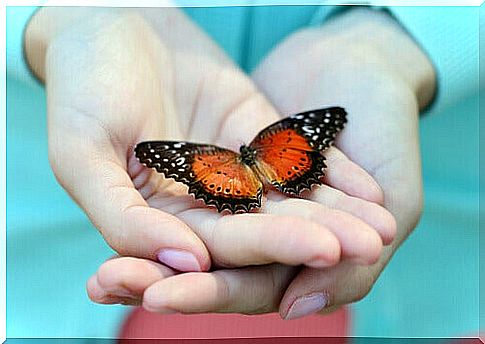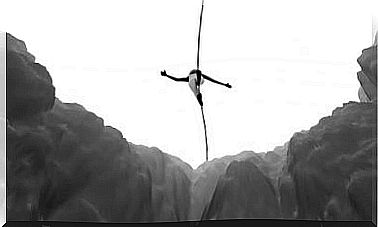The 4 Laws Of Detachment For Emotional Release

Within the approach of personal growth and spirituality, the term detachment is key to achieving happiness. It means being able to overcome the barriers of our comfort zone to stop needing, depending, and living in fear of losing dimensions that we cling to excessively. Because only when we are able to overcome the ego will we finally stop suffering.
Let’s try for a moment to explain what happiness is to us. Some would say that happy is someone who has great assets, a good partner, a large checking account. All of this undoubtedly covers many of our most basic needs. However, do these dimensions offer a genuine sense of well-being? In reality, the most accurate definition of what happiness is could not be simpler: happiness is the absence of fear, it is not knowing what anxiety is and what it knows.
Practicing detachment is therefore the first step in reaching that state. It is allowing ourselves to be freer, lighter, less attached to what we have or what we lack. It is living from the heart without having to compulsively need anything or anyone. At the same time, it also means being able and knowing how to give ourselves to others with authenticity and without pressure.
The emotional release that detachment generates offers us the option of living more honestly. It is then that the option to grow, to advance with knowledge of the facts, arises before us. Without harming anyone, without anyone putting his fence on us either, camouflaged with the chains of passionate, filial or even maternal love.
So let’s learn to put these simple laws on detachment into practice …
First law of detachment: you are responsible for yourself
The first law of detachment invokes a basic principle of personal growth: responsibility. Let’s think about it: no one is going to remove every stone we find on the road for us. Like no one will breathe for us or volunteer to carry our sorrows or pains.
Each of us are the architects of our own existence. And something like that implies courage. It means that we must detach ourselves from the opinions of others, from the need to be validated, to wait for the approval of others to move forward with our decisions, dreams or projects.
We are free people, ready to create the destiny that we deem appropriate.

- Do not put your own happiness in the pocket of others. Do not conceive the idea that to be happy in this life, it is essential to find a partner who loves you, or to always have the recognition of your family. Loneliness is sometimes the best company to promote our self-realization.
- If the barometer of your satisfaction and happiness is in what others give you, you will not achieve more than suffering. The reason? They will seldom cover all your needs.
- Cultivate your own happiness, feel responsible, mature, become aware of your decisions and their consequences, choose for yourself and never let your well-being depend on the opinions or advice of others.
Second law of detachment: live in the present, accept, assume reality
In this life, nothing is eternal, nothing remains, everything flows and returns to its path weaving that natural order that is so difficult for us to assume at times. People are almost always focused on everything that happened in the past and that, in some way, now becomes a heavy burden that alters our present.
Often, we are so “attached” to all those events that occurred in yesterday that we forget the most important: living. We put all our attention on those family disagreements, on the trauma that surrounds us and conditions us, on that loss, on that sentimental failure or that unsurpassed frustration … All of these are anchors that hold us, that put chains on our feet and hooks on our soul .
Detachment is also joining strengths to look at the present and allow us to heal wounds. We must encourage acceptance, assume realities and not resist certain evidence. What’s more, sometimes we have no choice but to forgive and even forgive ourselves. Only then will we feel more liberated, ready to appreciate with all our senses the “here and now”, this present where you have your true opportunity.

Third law of detachment: promote your freedom and allow others to be free too
Detachment is not cutting ties or establishing ties marked by emotional coldness. Quite the opposite. We are facing a dimension where we can learn to iron out fears in order to love in a more authentic and respectful way. It is knowing how to give and allow ourselves to receive without pressure, without blind needs, without anxieties or with the eternal fear of being abandoned. It is preferring without needing the other.
Also, another aspect to remember about detachment is that we are not obligated to be responsible for the lives of others. Thus, there is no shortage of those who, for example, yearn to find a partner to flee from loneliness or even to heal old wounds of yesterday. Let’s be clear that none of us have the obligation to be a hero. To rescue others to heal their loneliness or fractures caused by old relationships. These types of ties only generate suffering.

Intense attachments are never healthy. Take, for example, those obsessive parents who go too far in protecting their children and prevent them from being able to mature, to move forward safely to explore the world.
The need to “detach” is vital in these cases, where each one must go beyond the limits of certainty to learn from the unforeseen, from the unknown.
Fourth law of detachment: assume that losses will happen sooner or later
In every Buddhist and spiritual current the idea of impermanence is present. We speak of that dimension where we are obliged to understand “yes or yes” that in this life nothing lasts, that nothing can be contained eternally. Relationships and even material things change, mature, and often even fade away. Let us therefore assume the idea of change, absence and even loss as a vital law to which we cannot close our eyes.
Some people will leave forever, children will grow up, some friends will cease to be friends and some loves will leave the warmth of our hand … However, many more things will come. Because life is change, but also movement and all of this is part of detachment. And as such, we must learn to accept it in order to face it with greater integrity. With greater force. However, what will never change is your capacity to love: always start with yourself.









